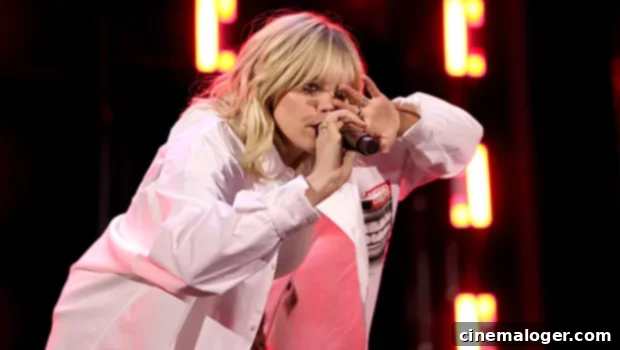Renee Rapp’s Journey of Healing: How ‘Snow Angel’ and SNL Became a Beacon for Sexual Assault Survivors
In a powerful and candid interview, singer and actress Renee Rapp, known for her captivating roles in ‘Mean Girls’ and ‘The Sex Lives of College Girls,’ has opened up about a deeply traumatic experience that profoundly impacted her life and art. The ‘Snow Angel’ artist shared insights into her personal battle with sexual assault, the difficult decision to distance herself from certain individuals, and how this harrowing experience ultimately inspired her acclaimed song “Snow Angel” and its poignant performance on ‘Saturday Night Live.’ Her story is a testament to resilience, the healing power of art, and the critical importance of setting boundaries in the aftermath of trauma.
Renee Rapp, a rising star at just 24 years old, delved into the specifics of her sexual assault experience and the subsequent choice to re-evaluate her social circle during a recent conversation with The Hollywood Reporter, published on Wednesday, February 28. The Mean Girlsactress articulated how this deeply disturbing event served as the catalyst for writing the title track of her debut album, Snow Angel. When probed about her emotional state while discussing such a sensitive topic, Rapp admitted to still navigating the complex labyrinth of her feelings. “I still feel like I’m sorting through those feelings,” she confessed. “I do understand that it was an incredibly traumatic experience that I don’t remember at all.” This sentiment highlights a common aspect of drug-facilitated sexual assault, where memory gaps can add another layer of confusion and emotional distress for survivors.
Rapp further elaborated on the peculiar difficulty of recounting an event she has no direct memory of, stating she feels “weird” to talk about it. Despite the memory void, her subconscious has clearly been working through the trauma. Two years after the incident, Renee reached a critical turning point in her healing journey: the realization that she needed to sever ties with certain individuals who were present that night. “I just recently started to be like, ‘Wait, the people that let this happen to me suck,'” she candidly told THR. This awakening led to tangible actions, such as unfollowing former acquaintances on social media. “I actually don’t want to follow this person on Instagram anymore because they left me at a club to get drugged.” This declaration underscores the profound betrayal she felt and the necessary step of reclaiming control over her personal space and peace of mind by removing toxic influences.

The interviewer pressed Renee on whether she had confronted the individuals involved or present during that fateful night. Rapp confirmed that she did have a discussion with her then-boyfriend about the incident. She recounted the unsatisfactory nature of their conversation, highlighting a common disconnect that survivors often face. “I talked to the guy that I was seeing the day after, and I remember he was like, ‘Are you OK? What happened? I guess you went home. Hope you’re OK.’” Renee’s response articulated her frustration and the alarming lack of awareness from his side: “I’m like, ‘I didn’t go home. Don’t be dumb.'” This exchange illustrates the critical importance of empathetic and informed responses from loved ones in the aftermath of trauma, and the pain when such understanding is absent. The casual assumption that she simply “went home” minimized the severity of what had truly occurred, adding to her emotional burden.
The difficult conversation with her then-partner serves as a stark reminder of the broader societal issues surrounding consent, responsibility, and bystander intervention. It also highlights the emotional labor often placed on survivors to educate others about their experiences and the impact of non-supportive reactions. For many, navigating these conversations can be as traumatizing as the initial event, leading to feelings of isolation and further re-traumatization if not handled with immense care and sensitivity. Renee’s openness about this particular interaction resonates with countless individuals who have faced similar dismissive attitudes, underscoring the urgent need for greater awareness and education about sexual assault and its aftermath.
When questioned about whether she had an inkling that she was associating with an unhealthy crowd, Renee candidly admitted that, deep down, she harbored some reservations. “I knew, but I didn’t know to the extent, and I made a lot of excuses for it, but all my friends knew.” Her close friends, it seems, were more attuned to the escalating pattern of her social activities and expressed their concerns. “[They] were like, ‘What the fuck is going on? You realize you’ve been out every single night and it’s a Tuesday. That’s wild,'” she recalled. This revelation points to the insidious nature of toxic environments, where individuals might rationalize behaviors or overlook red flags until a crisis occurs. The perspective of her friends, acting as external observers, offered a crucial reality check that she was perhaps not ready to fully accept at the time. This collective awareness among her genuine friends underscores the value of true companionship and their attempts to protect her from potential harm.
The importance of surrounding oneself with a supportive and vigilant peer group cannot be overstated, especially for young adults navigating complex social landscapes. Renee’s story emphasizes how friends can serve as crucial warning systems, noticing patterns of behavior or risks that might be obscured by the individual’s own rationalizations or external pressures. Recognizing and heeding these concerns, even when difficult, is a vital part of personal safety and emotional well-being. Her admission also sheds light on the internal struggle of acknowledging an unhealthy situation, a struggle often complicated by loyalty, fear of exclusion, or a desire to fit in. Ultimately, her decision to cut ties with those who enabled or overlooked her vulnerability represents a profound act of self-preservation and a move towards genuine healing.
When Renee decided to perform “Snow Angel” on SNL, she seized the opportunity to share her deeply personal story with a vast audience, allowing her performance to become a powerful vehicle for her message. Her emotionally charged rendition transcended mere entertainment, transforming into a profound act of advocacy and solidarity for countless survivors. She expressed that after publicly sharing her experience through this platform, she has received an overwhelming number of messages from individuals who have undergone similar ordeals. This outpouring of shared experiences validated her decision and reinforced the universality of such traumas, making her feel less alone in her journey.
The resonance of her “Snow Angel” performance on such a prominent stage underscores the immense power of art as a medium for healing and social change. Through her music, Renee Rapp has not only processed her own pain but has also created a safe space for others to acknowledge theirs. She expressed a profound hope that by sharing her story, others might glean valuable lessons, fostering a greater collective understanding and, crucially, helping to prevent more people from becoming victims of sexual assault. Her artistic expression thus transcends personal catharsis, evolving into a beacon of hope and a catalyst for vital conversations around consent, support for survivors, and the eradication of sexual violence.
The Profound Impact of “Snow Angel”
The song “Snow Angel” itself is a raw and vulnerable exploration of trauma, memory, and the aftermath of sexual assault. While Renee Rapp has not explicitly detailed specific lyrics, the emotional weight and thematic depth conveyed through her discussions indicate a powerful narrative crafted from her personal ordeal. For artists like Rapp, transforming such profound pain into music is often a crucial part of their healing process. Songwriting allows for a structured outlet for chaotic emotions, enabling the artist to regain some sense of control over their narrative and externalize feelings that might otherwise be overwhelming. This creative reclamation of her experience makes “Snow Angel” more than just a song; it’s a testament to survival and resilience.
The choice to title the album and its lead track “Snow Angel” carries symbolic weight. A snow angel is typically associated with innocence, playfulness, and pristine beauty. When contrasted with the dark reality of sexual assault, the title might evoke a sense of lost innocence, or perhaps a fragile, transient beauty found even amidst profound brokenness. It could also symbolize the act of leaving a mark, a footprint in the snow, representing the lasting impact of the event and her subsequent efforts to transform it into something meaningful. This nuanced title invites listeners to delve deeper into the layers of meaning embedded within her musical narrative.
Reclaiming Her Narrative: The SNL Performance
Performing “Snow Angel” on ‘Saturday Night Live’ was not merely a career milestone for Renee Rapp; it was a deeply personal and politically charged statement. ‘SNL’ offers one of the largest and most diverse audiences in live television, making it an unparalleled platform for sharing sensitive messages. For Renee, this performance was an opportunity to transcend the traditional role of a pop star and step into the role of an advocate. The vulnerability she displayed, coupled with the raw emotion evident in her delivery, allowed her story to resonate on a profound level with millions of viewers. This public act of bravery further solidified her position as an artist unafraid to confront difficult truths and use her platform for greater good.
The feedback she received post-performance highlights the critical need for more visible survivor stories. When public figures like Renee Rapp share their experiences, it breaks down the walls of silence and shame that often surround sexual assault. It normalizes the conversation, encourages other survivors to come forward and seek help, and educates those who may not understand the complexities of trauma. By performing “Snow Angel” on ‘SNL,’ Renee Rapp transformed her personal pain into a collective point of empathy and understanding, fostering a community of solidarity and accelerating the ongoing dialogue about consent, accountability, and support for survivors.
The Unfolding Journey of Healing and Advocacy
Renee Rapp’s journey, as she candidly shares, is not one of complete resolution but rather an ongoing process of healing and self-discovery. Her admission that she is “still sorting through those feelings” is a crucial aspect of her narrative, highlighting that healing from trauma is rarely linear or finite. It involves continuous self-reflection, boundary-setting, and often, professional support. Her decision to actively remove individuals who contributed to her vulnerability from her life is a powerful lesson in self-care and prioritizing one’s mental and emotional well-being above potentially harmful social connections. This act of self-preservation is a vital step in regaining personal agency after a traumatic event.
Beyond her personal healing, Renee Rapp is emerging as a significant voice in the advocacy for survivors of sexual assault. Her hope that others can learn from her experience to prevent future incidents is a testament to her commitment to social change. By speaking out, she contributes to dismantling the culture of silence and victim-blaming that has historically plagued discussions about sexual violence. Her honesty fosters an environment where survivors feel empowered to speak their truth and seek justice or support. Ultimately, Renee Rapp’s story is a powerful reminder that vulnerability, when shared with courage and intention, can be a profound source of strength, connection, and societal transformation. Her art and her voice continue to illuminate paths toward healing and prevention for many.
